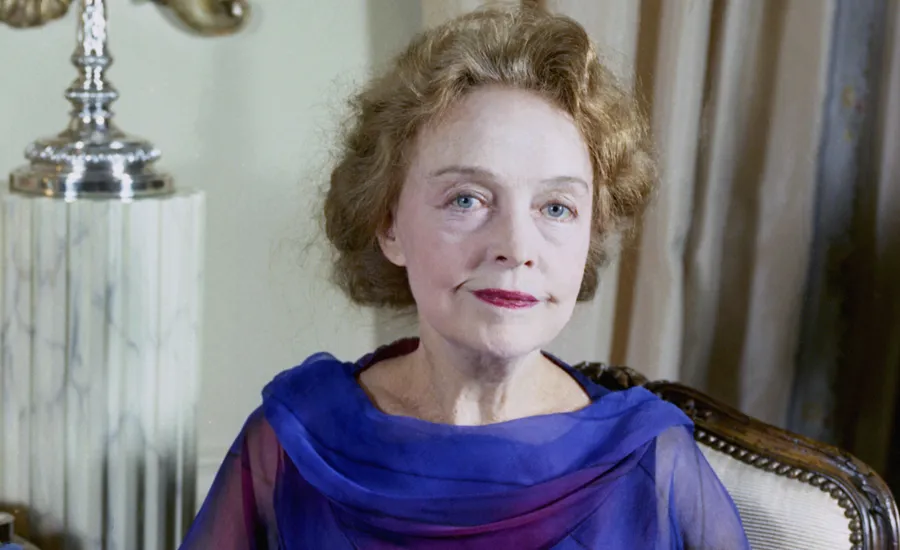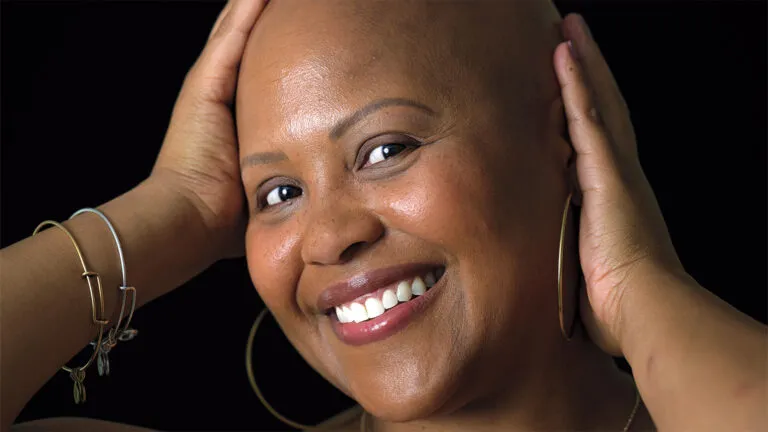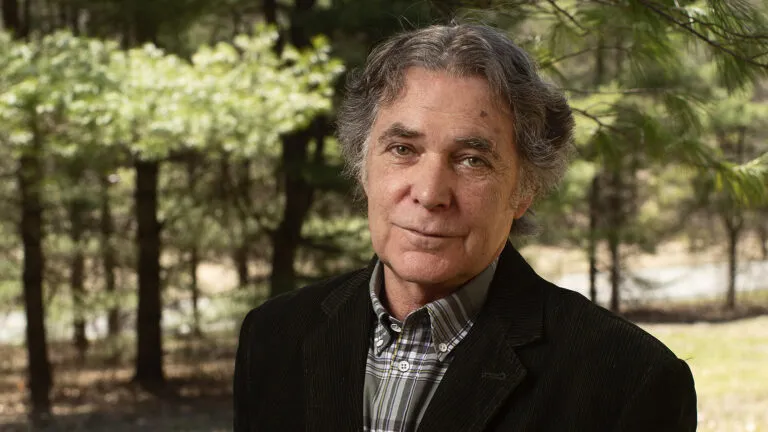Ours was a small, close-knit family. Just we three girls—Mother, my sister Dorothy and me. Our world was that of the stage, and then later the movies, silent movies. Our friends were pioneers of the new medium—Mary Pickford, Anita Loos, Charlie Chaplin—monumental figures who helped shape the history of film.
Our mentor was David Wark Griffith, the genius of early film-making who created the form, meaning and grammar for telling stories on film. But most of all, there was Mother.
Our father left us when we were young, but Mother supplied the bolstering strength and the affection and warmth of two parents. She was a delicate woman, small, almost frail, yet a woman of strong courage. She kept us together, traveled everywhere with us, read the Bible during long train rides to the next town and the next performance, taught us to pray, and to have faith. We needed that faith.
READ MORE: IRENE DUNNE ON HER FAITH JOURNEY
As I look back on it, life was a constant challenge. In the beginning we were poor, and there were times when food was in short supply. I remember existing on a diet of oatmeal and milk, one portion for breakfast and two for dinner. I took my first stage job at age five in the play Convict’s Stripes and went on the road. Dorothy’s career began at age four when she played in East Lynne.
As youngsters, we learned that our profession was considered a social disgrace, and we were warned, “Don’t tell anyone you’re in the theater because children won’t be allowed to play with you.”
When we started making movies—in New York, before Hollywood became movieland—it was just a job to do while waiting for our next hoped-for role on the stage. We worked late into the night, sometimes on empty stomachs, and were expected back at the studio before dawn.
There were no doubles or stuntmen. We played every scene, whether it was outdoors in the winter riding river currents on an actual ice floe until Mr. Griffith was satisfied with the scene, or playing the victim of a brutal beating and ending up with welts and bruises. Total dedication was expected; we were driven to perform perfectly, totally—for five dollars a day.
In late 1916—while World War I was raging in France—Mr. Griffith went to London to show two of his films at the famous Drury Lane Theatre, which had never before shown a motion picture in its long history.
READ MORE: ANN BLYTH ON PERSONAL FAITH
While there, he was invited to 10 Downing Street by the Prime Minister, Lloyd George. England and France wanted Mr. Griffith to produce a war film that would help the Allies’ cause.
As a result, Mr. Griffith sent for Dorothy, actor Bobby Harron, cameraman Billy Bitzer and me. After seven months in England and France, we came back with 86,000 feet of film, which became five movies including Hearts of the World. Mother, of course, would not let us go without her.
The film was shot in range of long-distance guns, and shells and shrapnel fell close by. We were working where even nurses were not allowed to go. We shot scenes in complete secrecy and tried to block out the horror around us—exploding shells, men wounded and lying in mud.
Mother drove with us to the location each day, passing burned-out homes, scorched fields and destroyed orchards, it was a frightening experience for all of us, and it took its toll.
In the ensuing months Mother, Dorothy and I became highly nervous and lost weight. My sister and I recovered from the ordeal, being too young to comprehend the horror we had witnessed. But Mother did not. She suffered from shell shock the same as many soldiers did. Her hands shook so that she could not hold a cup of tea.
And this, in turn, led to other ailments. We did not fully realize how serious the effects were until eight years later when Dorothy summoned me to England where she was working: “Mother has had a serious stroke,” read the cablegram. “Please come quickly.”
Still in costume and wearing makeup, I left the MGM Hollywood set of The Scarlet Letter and caught a train for New York. News of Mother’s illness preceded me, and hundreds of sympathetic fans stood on station platforms along the way to express their sympathy and tell me of their prayers for Mother’s recovery.
READ MORE: JOAN FONTAINE ON FINDING A HOME
Mother was not expected to live, and I felt horribly alone, but the warmth and love of the people waiting on those platforms lifted my spirits and gave me hope.
When I arrived in London, I found Dorothy badly shaken and Mother deep in coma, but shortly after, she began to improve. Within three weeks she was able to make it clear that she wanted me to take her home. A doctor and nurse accompanied us on the crossing by ship to New York, then after a two-week rest, we had a private car attached to a fast westbound mail train.
I had to return to California to work, and I brought Mother—still unable to speak or even lift her head—on a roaring, swaying train in the heat of July. No air-conditioning then, of course. To keep the car cool, we positioned tubs of ice with fans blowing on them. And as the train steamed across the plains, I held Mother’s thin hand and read aloud from her Bible of Christ’s promises of eternal life and His unfailing love.
I read to Mother from I Corinthians, from Colossians, Psalms and Isaiah, and with each passage I silently prayed that God would spare her, that He would give us more years together.
One night, reading aloud from the 58th chapter of Isaiah, I could not help but feel the promise in the words that ran: “Then shall thy light break forth as the morning, and thine health shall spring forth speedily: and thy righteousness shall go before thee; the glory of the Lord shall be thy rearward.” (58:8)
As I read them, it seemed to me that those words held the key to Mother’s life.
When we arrived in Los Angeles, Mother’s condition deteriorated. We took her to a beach house, which we had rented from Mary Pickford’s mother. Mary, whom we’d known as Gladys Smith, had been one of our closest friends since childhood days when our two families had shared an apartment in New York City in order to save money.
However, even the sound of the ocean seemed to disturb Mother. So we had to rent a house on top of the Palisades.
READ MORE: ROSALIND RUSSELL ON FAITH AND HEROISM
Mother was carried to a pretty room on the second floor that had large windows flooding the chamber with light. It was cheery and warm, and an ocean breeze billowed the lace curtains. I liked it immediately and felt that it would cheer Mother. But the doctor pulled down the shades. He wanted her to have total quiet. Not even the sunlight should distract her.
Weeks passed, and as I sat in that darkened room listening to Mother’s labored breathing, I felt a dread, a sense of hopelessness. There was no more strength left in this pale, sickly form. This was my mother who had given me love, who had given me life, and I sat there helpless.
On the eve of Mother’s 49th birthday, September 16, after the doctor had paid his daily, gloomy visit, I stepped out into the garden. The sun shone brightly as I sat in a wicker chair and buried my head in my hands. I pictured the still, pale woman in that second-floor room, too weak to respond even to the touch of my hand on hers. It was as though she were already dead, shut off from friends, from life, from light …
Light!
At that moment the words from Isaiah came back to me: Then shall thy light break forth as the morning, and thine health shah spring forth speedily… The very words that had so filled me with hope as the train had roared through the night gave me hope again. Still another passage rushed back into my mind, the words of Jesus: I am the light of the world: he that followeth Me shall not walk in darkness, but shall have the light of life. (John 8:12)
READ MORE: MARY MARTIN ON HEALING SOLITUDE
I ran upstairs. One after the other I raised the shades in Mother’s room, then pushed open the windows. California sunshine flooded in and bathed Mother in its warmth. She smiled slightly. I knew then, I really knew, that the light touching her face was life-giving. I knew our prayers would be answered. God would sustain us.
That afternoon I went downstairs and telephoned a number of our good friends. “Tomorrow is Mother’s birthday,” I said. “Could you stop by to see her, just for a moment?”
The next day the windows were wide open. Mother’s room was filled with roses, and little by little our friends arrived and tiptoed to Mother’s bed and told her how much she was loved. From then on, Mother grew stronger.
Our journalist friend, H. L. Mencken, helped us find a specialist who took over Mother’s case, and soon we were able to carry her down to that same garden where I had been inspired to open her windows to the light.
Mother’s health did spring forth, and she lived for 22 years after that—22 happy, creative years.
In the beginning there were just the three of us, Mother, Dorothy and me. Now there is just me alone. Yet not really alone, for I feel our little family’s closeness still.
By my bed I keep my mother’s Bible, its pages heavily marked and underlined with favorite passages, passages of strength and hope—and light. Often I think back to the time that His light restored my mother’s life, reaffirming my belief—instilled years before by Mother—that God’s power is boundless, that it can come to us silently, lovingly, pushing the darkness aside.
This story has been slightly altered from its original published form.
For more inspiring stories, subscribe to Guideposts magazine.





